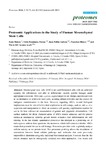Proteomic applications in the study of human mesenchymal stem cells

View/
Use this link to cite
http://hdl.handle.net/2183/18446
Except where otherwise noted, this item's license is described as Creative Commons Attribution 3.0 International License (CC-BY 3.0)
Collections
- Investigación (FCS) [1293]
Metadata
Show full item recordTitle
Proteomic applications in the study of human mesenchymal stem cellsAuthor(s)
Date
2014-02-07Citation
Mateos J, Pernas PF, Labora JF, Blanco F, Arufe MD. Proteomic Applications in the Study of Human Mesenchymal Stem Cells. Proteomes. 2014 Feb 7;2(1):53-71.
Abstract
Mesenchymal stem cells (MSCs) are undifferentiated cells with an unlimited capacity for self-renewal and able to differentiate towards specific lineages under appropriate conditions. MSCs are, a priori, a good target for cell therapy and clinical trials as an alternative to embryonic stem cells, avoiding ethical problems and the chance for malignant transformation in the host. However, regarding MSCs, several biological implications must be solved before their application in cell therapy, such as safe ex vivo expansion and manipulation to obtain an extensive cell quantity amplification number for use in the host without risk accumulation of genetic and epigenetic abnormalities. Cell surface markers for direct characterization of MSCs remain unknown, and the precise molecular mechanisms whereby growth factors stimulate their differentiation are still missing. In the last decade, quantitative proteomics has emerged as a promising set of techniques to address these questions, the answers to which will determine whether MSCs retain their potential for use in cell therapy. Proteomics provides tools to globally analyze cellular activity at the protein level. This proteomic profiling allows the elucidation of connections between broad cellular pathways and molecules that were previously impossible to determine using only traditional biochemical analysis. However; thus far, the results obtained must be orthogonally validated with other approaches. This review will focus on how these techniques have been applied in the evaluation of MSCs for their future applications in safe therapies.
Keywords
Mesenchymal stem cell
Proteomic analysis
Characterization
Differentiation
Proteomic analysis
Characterization
Differentiation
Editor version
Rights
Creative Commons Attribution 3.0 International License (CC-BY 3.0)
ISSN
2227-7382






